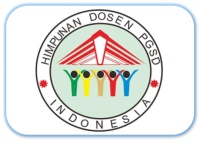Pengaruh Model Project Based Learning (PjBL) Terhadap Hasil Belajar Keliling Dan Luas Bangun Datar Kelas IV SD
Abstract
This study aims to determine the effect of the Project Based Learning (PjBL) model on student learning outcomes in the circumference and wide flat area in grade IV Elementary School. This type of research is Quasi Experimental. The sampling technique uses purposive sampling. The instrument used was an objective test. Based on the calculation results of the analysis, t-test with a significance level of 0.05 obtained t-count (1.69) and t-table (1.66). So that the t-count ˃ t-table, where 1.69 ˃ 1.66. Ha accepted, it can be concluded that there is an influence of the use of the PjBL model on learning outcomes in the traveling material and flat area of the fourth grade students of SDN Gugus II, Lubuk Kilangan Padang.
Keywords
Full Text:
PDFReferences
Al-Tabany, Trianto Ibnu Badar. 2014. Mendesain Model Pembelajaran Inovatif, Progesif, Dan Kontekstual (Konsep Landasan Dan Implementasinya Pada Kurikulum 2013 Kurikulum Tematik Integratif. Jakarta: Pranamedia Group.
Asna Mardin, Melva Zainil. 2019. Pengaruh Model Project Based Learning Terhadap Kemampuan Pemecahan Masalah Pada Materi Penyajian Data Di Kelas IV SD. Jurnal E-Tech.Vol. 00, No 00 ISSN 2541-3600
Desyandri, dkk. 2018. The Effect Using Quantum Learning And Motivation In Learning Toward Students Achievement. Jurnal Aplikasi IPTEK Indonesia 3.
Faisal. 2014. Sukses mengawal kurikulum 2013 di SD (Teori dan Aplikasi). Yogyakarta: Diandra Creative.
Hasratuddin. 2014. Pembelajaran matematika sekarang dan yang akan datang berbasis karakter. Didaktik matematika, 1(2), 30-42, https://doi.org/10.24815/jdm.vli2.2059
Kasyifa, dkk. 2015. “Pengaruh Model Pembelajaran Berbasis Proyek Terhadap Hasil Belajar Matematika Ditinjau Dari Kemampuan Numerik Siswa Kelas IV SD”. E-jurnal PGSD volume 3, nomor 1
Sugiyono. 2016. Metode Penelitian Pendidikan: Pendekatan Kuantitatif, Kualitatif, dan R&D. Bandung : Alfabeta
DOI: http://dx.doi.org/10.24036/e-jipsd.v9i3.10077


